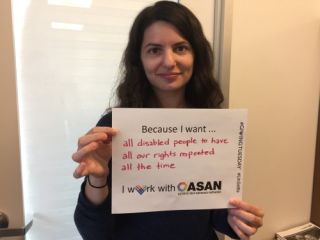Autism
The Evolution of an Autism Self-Advocate
How Zoe Gross changed the conversation around disability-filicide.
Posted March 6, 2023 Reviewed by Devon Frye
Key points
- Disability filicide is a crime, but parents who kill their disabled children are sometimes treated with sympathy.
- Autism self-advocates, including Zoe Gross, aim to change the conversation about disability filicide and publicly mourn the victims.
- The U.S. often does not provide adequate support to families with disabilities, but this failure should not be used to justify murder.

Many years ago, when I first started doing research for what would become this blog, a parent on my social media posted a news article about a 52-year-old mother, Elizabeth Hodgins, who shot her 22-year-old autistic son, George Hodgins, before turning the gun on herself. The person who posted the article, much like the journalist who had written it, directed sympathy not toward George, but toward Elizabeth, the mother.
Zoe Gross, Director of Advocacy at the Autistic Self Advocacy Network (ASAN), was shocked by how some in the media called Elizabeth Hodgin’s “George’s guardian angel,” the ease with which the legalization of euthanasia for the disabled was discussed, and the Autism Society’s publication of “the tragic story of Elizabeth Hodgins.”
As a response, Gross started the Disability Day of Mourning, which remembers the thousands of murder-suicides of parents, many like Elizabeth and George, who’ve succumbed to the most cynical of choices: disability filicide (the website of the same name is created and maintained by a dedicated volunteer named Dax). It is also a remembrance of the disabled who were murdered by perpetrators who are still alive. It’s an impressive memorial that turned the discussion of disability filicide (and murder of the disabled) on its head.
“I wanted to have a place where the disability community could come together,” Gross explained, “and commemorate George not as an object of pity or as the beneficiary of a mercy killing, but as someone whose life was stolen from him. All the ethics that are taken for granted when we talk about murder simply go out the window when the victim is disabled… I understand that our country doesn't provide enough support to parents with disabilities or to parents whose children have disabilities. I just feel that's a separate conversation than murder.”
A controversy quickly grew. On one side, some parents of disabled children were sympathizing with Elizabeth Hodgin’s struggle. Some were also becoming increasingly incensed that autism advocates, who could vocalize their protest and vocalize it eloquently, were speaking on behalf of their non-verbal children.
On the other side, many disability advocates were determined not to let George’s murder be socially accepted. George was a human being who had been murdered, they argued. Murder, no matter the circumstances, should not be justified. Ultimately, polarization developed between two groups of people who needed, more than anything, to work together.
Home Care Legislation
This was 11 years ago. Since then, Gross has helped move ASAN from a grass-roots organization to a Congressional lobby. She speaks with a measured calm, her tone reflecting an openness to listen to the concerns of a non-autistic parent of an autistic child. We talked twice, both times well over an hour.
“ASAN is not a direct support agency,” she told me, “so we can't provide people with care ourselves, but we can advocate for policy changes. We've advocated for the expansion of home- and community-based services… Something that we've been trying to do for a long time is getting home- and community-based services included in what's called the reconciliation package. This is a spending package that was planned to go through Congress with the Build Back Better Act. We had a very long fight to keep it in the Act and it stayed in for a really long time. Unfortunately, home- and community-based services were taken out at the last minute.”
“We have a problem in this country where, if you are on Medicaid, and you are deemed to need a certain level of support, you’re entitled to care in an institution," Gross said. "However, no one is entitled to care in their home and no one is entitled to care in the community. That means that states have waiting lists for community or for care in the home and community-based services, but they don't have waiting lists for institutions. Our package in the Build Back Better Act would have given states more money to expand home- and community-based services.”
The bill that Gross was championing would have also helped adjust the low pay for care workers and therefore high turnover and poor quality of service and would have reduced the waiting lists for home care funding.
“The waiting list can be as long as ten years in places like Texas,” she said. “So you've got people waiting a decade or almost a decade for home services because they don't want to be in an institution.”
Giving the Disabled a Voice in Congressional Testimony
Gross has also been working on more than just Congressional legislation. She helped those with intellectual disabilities have their voices heard in Washington.
“A lot of these conversations about care programs, whose primary beneficiaries are people with intellectual disabilities, were happening without people with intellectual disabilities. A barrier to submitting written testimony is if you don't write or don't read fluently, so I helped develop a way for people with intellectual disabilities to submit written testimony to Senate hearings. And it's also not going to be like on the nuances of a certain policy. It's going to be on the principles of the policy like, 'I want to live in my own home.' And that is an important way for disabled people to contribute.”
I have seen how people treat my son when he tries to advocate for himself, especially in legal situations. They infantilize him, brush him off, or worse, entirely ignore him. Therefore, I can only imagine that it is incredibly challenging to be an autism advocate with autism, especially in Washington D.C.
It is not surprising to me that Gross was given the Champion of Change award by the Obama administration for her advocacy. In her acceptance, she said of George Hodgins, “We were both autistic, very close in age, both struggling with our transitions to adulthood and independent living… The first point of difference between George and me: I will turn 23 this fall. George never will.”




